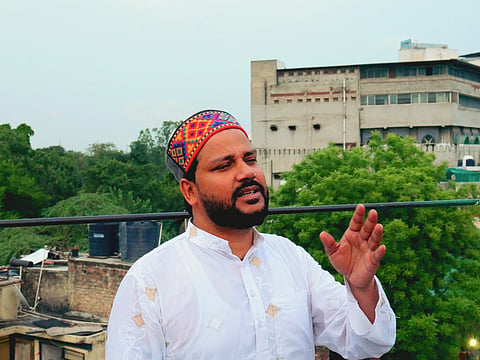
The Qawwals, including Sibtain Nizami and Saqlain Nizami, sons of the late Ustad Meraj Ahmad from the Qawwal Bhache Delhi Gharana, have been carrying the legacy for five decades. Although their talent is admired by all, the world remains unaware of the challenging living conditions they endure.
Embarking on a mesmerizing journey, The Mooknayak unravels the enchanting lives of the Qawwals at Nizamuddin Dargah. With an evocative lens, the article unveils the profound legacy of Sufi music and the tireless devotion of these talented artists, shedding light on their unseen struggles and unwavering commitment to preserving this cherished tradition.
Living with their family of six in a one-room set, including two sisters, one brother, and Sibtain's wife, they make the most of their limited income to keep their family content. While Saqlain also sings at various events to support the family financially, Sibtain focuses primarily on singing at the Nizamuddin Dargah.
The Mooknayak spoke with Saqlain to get details of their simple life in a humble above. Saqlain shared, "My family consists of five other members. I have an elder brother, Sibtain, and a younger brother, along with 2 sisters and my bhabhi, who is Sibtain's wife. The three of us brothers primarily sing at the Nizamuddin Shrine, with Sibtain playing the dholak and me handling the harmonium. I often travel across the country in search of concerts or to perform at cafes, while weddings and functions also serve as secondary sources of income. The women in our household mainly stay at home, taking care of the family. My younger sister, Mizba, has completed her class 10th through distance mode at Jamia Millia Islamia, New Delhi, while Sibtain's wife and my elder sister efficiently manage the household."
Saqlain and Sibtain's house is located near the dargah, but reaching there requires crossing many interior lanes. The house itself is in a narrow building with a narrow staircase. Inside, there is a small room with an accompanying kitchen and washroom, where the family of six resides.
Another staircase leads to a separate room where a few other Qawwals stay. Finally, the next staircase leads to the rooftop, offering a breathtaking view of Delhi's skies, with Humayun's Tomb visible from the place. This rooftop is also Saqlain's chosen spot for his evening Riyaaz.
Saqlain, sharing his perspective with team The Mooknayak, explained how their childhood memories revolve around the Nizamuddin Basti. Saqlain says, "We have been carrying this timeless legacy since our childhood. Singing at the Nizamuddin Shrine until late at night can be exhausting, but we find solace in resting afterward. My evening Riyaaz keeps me connected to the soulful essence of our Sufi music."
The streets they once played in, including the vicinity of Ghalib ki Mazaar, have undergone changes over the years, with some places now closed for visitors. The condition of the lanes is disheartening, especially during the rainy season, as the roads remain damaged and waterlogged.
Saqlain shared his thoughts about the Nizamuddin Basti, saying, "Our childhood was spent on the streets of Nizamuddin. Over the years, the place has undergone significant changes. We used to play near Ghalib ki Mazaar (Mirza Ghalib's Shrine), but now it is closed to visitors. The condition of the lanes here is worse, and though they were broken to construct new ones, they have not been repaired yet. With the rainy season in full swing, water is everywhere, making the road conditions miserable."Saqlain shared with The Mooknayak, "We sing at the Dargah until late at night, and also perform at other venues. As a result, we often come home late and sleep during the day. In the evening, we engage in practice and do Riyaaz to refine our art."
The daily Qawwali offering at the Nizamuddin Shrine is a special experience, particularly on Thursday evenings preceding the holiest day of the Islamic calendar, Friday. Among the several families that perform at the Dargah, Sibtain and Saqlain Nizami's electrifying voices captivate the gathering, drawing them closer to God.
Their dedication to their art, their spiritual connection through music, and their unwavering commitment to preserving this Sufi tradition make the Qawwals of Nizamuddin Dargah unsung heroes, deserving of recognition and support.
Also read:
You can also join our WhatsApp group to get premium and selected news of The Mooknayak on WhatsApp. Click here to join the WhatsApp group.